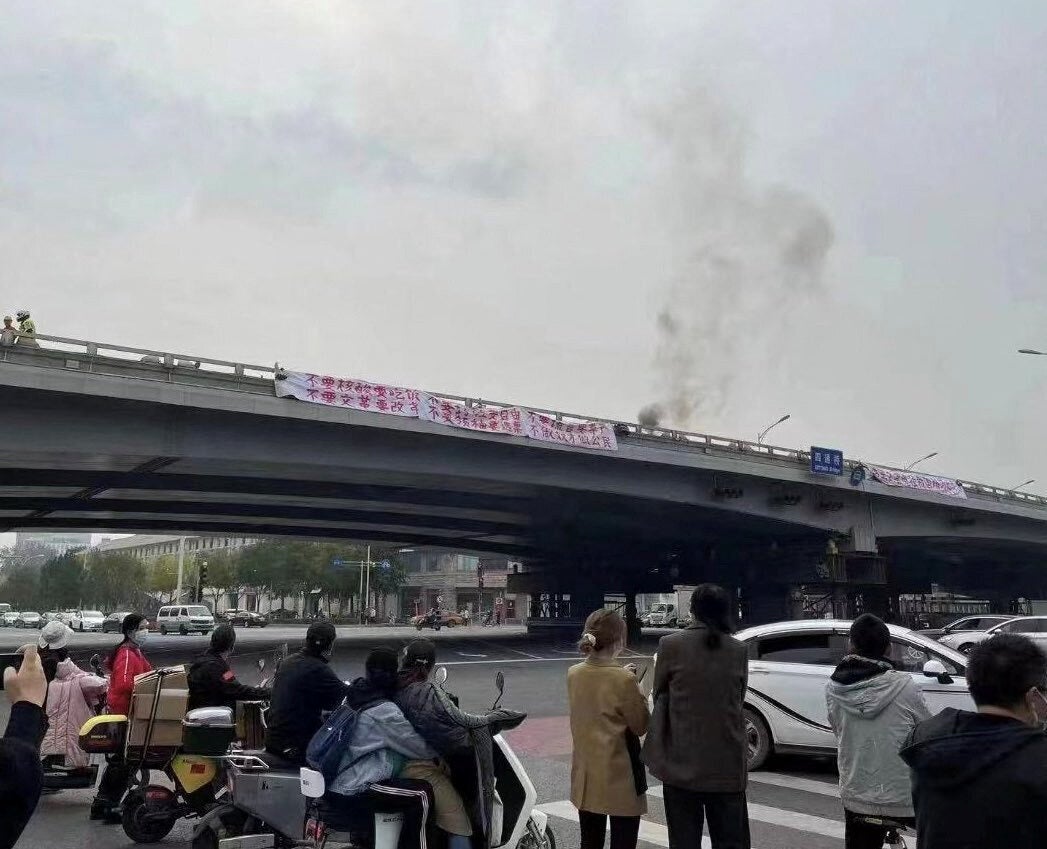‘Bridge Man’: How activist’s rare anti-Xi message in China is inspiring solidarity protests around the world
Defiant protests against Xi Jinp]ing’s ‘dictatorship’ have spread in universities
A rare protest by a lone man who called Xi Jinping a “dictator and national traitor” is inspiring an unusual wave of political dissent in the country and solidarity protests around the world as the Chinese president readies to give himself a third term in office.
The activist had strung two banners from the Sitong bridge on Beijing’s Third Ring, calling for the boycott and removal of Mr Xi.
The incident took place on the eve of the inauguration of the Chinese Communist Party (CCP)’s 20th National Congress on 13 October.
The man was protesting the government’s harsh zero-Covid policy that has caused frustration and anger among people, and called Mr Xi a traitor and dictator.
“We want food, not PCR tests. We want freedom, not lockdowns. We want respect, not lies. We want reform, not a Cultural Revolution. We want a vote, not a leader. We want to be citizens, not slaves,” read one banner.
“Remove the traitor-dictator Xi Jinping!” read another.
While the man was quickly detained by the authorities, photos and videos of the incident were widely circulated on social media, but were removed later as the country tightly controls such platforms.
Following his protest, the man, whose identity was not known, was dubbed “Bridge Man” and called “new tank man”, referencing the Chinese man who was famously photographed standing in front of a People’s Liberation Army (PLA) tank during the 1989 Tiananmen protests.
Since 13 October, anti-Xi messages are being seeing on around 200 campuses of several western universities in the US, the UK, Australia, Hong Kong, Australia and Europe.
Ripples of dissent against the president were also reportedly seen within China. There have been reports of a Shanghai-based retired teacher who had reportedly gone incommunicado after being detained following a similar protest.
Banners demanding “free China” and “democracy now” were hung down from a window of the University of California, Berkeley, and spread via images posted by a social media activism group.
A handwritten poster at Colby College in the US state of Maine read: “We, people of China, want to spread this message that speaks our mind in places without censorship.”
Protest signs have appeared at Stanford, Emory and Parsons School of Design in the US as well as in Camberwell, Goldsmiths and Kings College in London.
A poster, purportedly at the University of Melbourne, said: “Hi Xi Jinping. It’s time to retire!”
The social media accounts are using hashtags like #EndXictatorship and #FreeChina to lead online protests.
A similar protest sign at the University of Toronto sparked a counter poster which rebutted the anti-Xi message and defended the Chinese leader on the noticeboard.
In China, anti-government slogans and graffiti have clandestinely appeared in at least eight places, including Shenzhen, Shanghai, Beijing, Guangzhou and Hong Kong, according to VoiceofCN, an activism group run by anonymous Chinese nationals.
The group is collating signs of protests triggered by the incident on 13 October.
“The spirit of 8964 will never be snuffed out,” a piece of graffiti apparently scrawled on the walls of a public bathroom in Sichuan read. “8964” signifies the date of the Tiananmen incident; 89 refers to the year, while 6 and 4 are the month and date respectively.
Another graffiti with “reject dictatorships” scrawled above urinals was seen at the China Film Archive Art Cinema in Beijing.

“Most of us work or study outside of mainland China, but we all grew up in China,” the group’s administrator told Bloomberg. “Most students who put up the banners see it as a way to voice our anger, which has been suppressed for so long by the government and its censorship machines.”
Shanghai-based teacher Gu Guoping, 67, who reportedly shared the pictures and videos of the protest on the bridge, was detained and has been missing since then, according to Radio Free Asia, a media project funded by the US State Department.
The reactions to the Bridge Man’s protest come at a sensitive time when the Chinese president is poised to become the country’s most powerful leader after Mao Zedong by formally getting an unprecedented third five-year term in office.
Any opposition towards the Community Party leader can attract reprisals, including a lengthy prison sentence. In 2018, a woman defaced a poster of Mr Xi to oppose his “tyranny”. She was later admitted to a psychiatric hospital.
On Friday, several people took to the Chinese social media site Weibo and trended the hashtag “I saw it” which was later taken down.
“I saw it, we all saw it,” said one post. Many users alluded to a revolutionary saying made famous by Mao Zedong: “A tiny spark can set the prairie ablaze.”
However, several users claimed their accounts were suspended. China’s internet firewall has reportedly even restricted words like “bridge,” “courage” and “Beijing”.
The ongoing protest activity is similar to the “Not My President” protests that emerged in 2018 in overseas universities after the government did away with presidential term limits.
Join our commenting forum
Join thought-provoking conversations, follow other Independent readers and see their replies
Comments



Bookmark popover
Removed from bookmarks